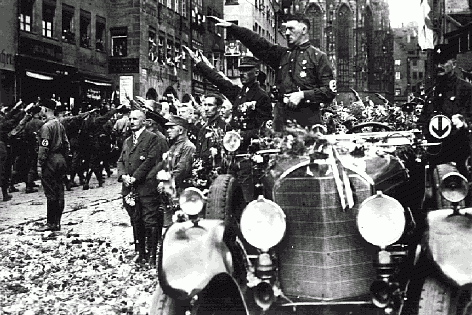
posted 9th July 2023
The life of Adolf Hitler altered the direction of the 20th century. Without him WW2 would never have happened and the shape of 21st century Europe would look markedly different. The story of how an eccentric personality like Hitler went from a nobody before WW1 to the most powerful man in the world by 1940 is a fascinating one. Before WW1 Hitler had twice been rejected by the Vienna School of Fine Art and had never had any gainful employment. He survived on his orphan’s pension and financial help from his family. Hitler’s story begins 13 years before he was born.
The name Hitler has become irreversibly associated with evil. But it could’ve been so different had it not been for an action taken by Adolf’s father, Alois. Alois had become a civil servant and had enjoyed a successful career as a custom’s official. Alois wanted to adopt his stepfather’s family name. Alois successfully lobbied the local authorities to allow him to change his name from Schicklgruber to Alois Hitler. When Adolf was born in 1889 his name could easily have taken on a more rustic tone rather than the one which had such a ring to it. As Adolf grew older his relationship with his father became toxic. Alois, in contrast to Adolf’s mother Klara, was cold and distant and regularly beat the young Adolf. Klara dotted on her son, and she was maybe the only person that Adolf truly loved in his life. Her death of cancer when he was 19 devastated the young Adolf. Hitler shed few tears when his father died when he was 13 but the death of his mother left a bitter legacy.
When Adolf was in his late teens he moved to Vienna with his childhood friend, August Kubizek. Adolf was convinced he was destined to become a great artist and Kubizek was going to study music. The young Adolf was to suffer bitter disappointment when he was rejected twice from the Vienna School of Fine Art. According to Hitler’s biographer Ian Kershaw, Hitler didn’t tell anyone about his rejection until he exploded with rage at Kubizek when he confessed that he’d been rejected by the Art Academy. Adolf’s rejection by the Academy plunged the young Hitler into an identity crisis. Slowly but surely, he and Kubizek drifted apart and didn’t meet again until 1938.
After years of drifting around Vienna, Adolf departed to Munich in 1913 where he was eventually tracked down by the Austrian police for not reporting for compulsory national service. Hitler denied any indiscretion and promised to report for duty. By the summer of 1914 European politics were on a knife edge with tension between the powers palpable. One event would change the direction of Hitler’s life. Since his teens he’d dreamed of being a great artist. His dream lay in tatters. He’d struggled through life in Vienna staying at various men’s hostels eking out a living painting postcards of Vienna’s landmarks. His existence was futile. His career an illusion. Then the great powers of the world went to war.
Hitler was always a German. His birth in the Austro-Hungarian Empire didn’t mean that Hitler felt any affection for the state of his birth. He’d always been a pan-German and believed in the unity of the German speaking peoples. Hitler joined the Bavarian Army despite his Austrian nationality. Hitler should never have been allowed to join the Bavarian Army but, most likely because of the delirium in Europe at the outbreak of war, Hitler’s lack of German citizenship was overlooked.
Throughout WW1 Hitler gained an identity. He was no longer the failed artist, he was now a respected soldier of the German state. Hitler became a dispatch runner during the war. Dispatch runners were vital to any army carrying orders and communications from unit to unit. They suffered very high casualty rates during WW1. Hitler’s proudest moment was when he was awarded the Iron Cross second and first class. However, devastation loomed for Hitler. By summer, 1918, Germany was starting to lose the war. Hitler himself had been badly wounded in a gas attack and was in hospital when the news came through that Germany had lost the war. The defeat was a bitter pill to swallow for a man like Hitler. He’d given everything for Germany during four years of war. The war had given him standing in society. A new sense of himself. Defeat for Hitler was more than just a lost war. It was a loss of identity. A loss of status. This defeat would create a new Adolf Hitler.
Hitler returned to Munich with Germany in chaos. Kaiser Wilhelm had abdicated, and Weimar democracy was beginning. Crisis had gripped German politics and German Communists were seeking to exploit the situation. The Communists managed to temporarily seize power in Munich, but they were eventually defeated by German Nationalist troops returning from the war. This attempt at revolution by the Communists further radicalised the German far right.
Hitler needed something to fill the void that defeat in war had created. He found it in politics. After the war Hitler didn’t leave the army but stayed on. The army had provided him with an identity, and not just that, a salary too. Hitler’s superior officers noted his increasing ability at public speaking and decided to use him to go into the Munich Beer Halls and report on the meetings of hard right nationalist groups. Hitler attended meetings of the German Workers Party and found a new home. Hitler was drawn to the party’s nationalism, antisemitism and its detestation of Weimar democracy.
As Hitler’s ego grew so did his ambition. Dietrich EcKart was a cultural heavyweight. A successful playwright, he’d become attracted to the politics of the hard right and extreme antisemitism. EcKart argued that Germany needed a saviour following the disaster of defeat in war. He found one in Adolf Hitler. EcKart and Hitler grew close with EcKart acting as Hitler’s mentor. As the 1920’s developed the two started to drift apart. Hitler was increasingly the indispensable leader of the German far right and he wanted those around him to be subservient to him and EcKart wasn’t a character to bow down to others. Hitler confirmed his position by having Anton Drexler removed as party leader and the party central committee agreed to Hitler becoming leader with dictatorial power over party affairs.
In 1923 one of the defining events of Hitler’s life was planned. The Munich Putsch has gone down in modern history as a failed attempt at seizing power but, in that failure, galvanised a movement. During the evening of the 8-9th of November Hitler, backed by other far right leaders like General Erich Ludendorff, attempted to overthrow the Bavarian government and march on Berlin. Around 2,000 Nazi party members, including future party heavyweights, Hermann Goring, Heinrich Himmler, Ernst Rohm and Rudolf Hess, headed towards Munich city centre but were met by regular army units who fired at the rebels. 16 Nazi members were killed, and Hitler was wounded. Hitler fled but was arrested two days later and charged with treason.
Hitler was put on trial for treason in February, 1924. Hitler played a clever game during the trial. He used it as a platform to promote himself and his political agenda. He argued that what he’d done was pursued for the German people. He dropped his extreme antisemitism and portrayed himself as a victim of persecution. The ploy worked. Hitler pled guilty to the charge of treason and was sentenced to five years a long with Rudolf Hess. Hitler would be eligible for parole after nine months. Hitler’s punishment was the most lenient that German law allowed.
Hitler was released from Landsberg prison after eight months behind bars. Hitler’s time in jail was comfortable. He was allowed visitors daily, and he completed a seminal work in his life, Mein Kampf. Mein Kampf was Hitler’s autobiography/political testament. In the book Hitler outlines his road to antisemitism as an ideology and his political programme for Germany. Volume 1 was released in 1925 and volume 2 in 1926. On release the book sold poorly. It was meant mainly for Nazi party members and didn’t have much impact until Hitler became German Chancellor.
After Hitler’s release the German far right were in a mess. The party had splintered into marauding gangs of thugs with no organisation or political purpose. After the failed Putsch Hermann Goring fled Germany for Austria where he developed an addiction to morphine that would last for the rest of his life. Heinrich Himmler was a relatively minor figure and escaped punishment for his role in the putsch. Ernst Rohm had been a Captain in the German army and loved the military life. After Hitler’s release the political strategy of the party changed from one of violent insurrection to one of actively participating in elections. Rohm was disgusted by the change of tactics and he and Hitler’s relationship started to turn sour. As his relationship with Rohm altered, Hitler developed a new relationship that would define his political vision. Josef Goebbels was a failed novelist from the Rhineland. Goebbels had been close to Hitler’s rival in Berlin, Gregor Strasser, but after meeting Hitler, Goebbels devoted the rest of his life to Hitler becoming the world’s first spin doctor.
The Nazi party, by the late 1920’s, was a fringe party with the fame that the Putsch bought them long since gone. In the 1928 Reichstag elections they only secured 2.6% of the vote. The economy was growing, unemployment was low, culture was thriving and bitter scoffs about the legacy of the war seemed backward looking. The party needed a crisis, and they got one. In 1929 Wall Street went into meltdown and the world economy was plunged into depression. No country was as badly affected as Germany. Unemployment skyrocketed, loans were bankrupting the country and inflation was running amok. Hitler had the circumstances he needed. Josef Goebbels spotted the potential to portray Hitler as a new politician. Goebbels developed a strategy of modern electioneering that made the other parties in Germany seem aloof and stale. Hitler travelled the land by aeroplane and spoke all over Germany. In the Reichstag election of 1932, the Nazi’s secured 230 seats making them the largest single party. Hitler was a stone’s throw away from power.
Hitler had one substantial problem within his own ranks, Ernst Rohm. After falling out with Hitler Rohm had gone to Bolivia to work as a military advisor but had been welcomed back to fill the leadership void at the heart of the SA as Chief of Staff with Hitler as overall commander. Rohm had never accepted Hitler’s democratic approach and was seen as a liability by those closest to Hitler. The SA were a violent street organisation who’d done the dirty work for the Nazi’s since the early 1920’s, but they were increasingly seen by the Nazi leadership as a source of embarrassment. Hitler needed order in the SA, and he hoped Rohm could bring it about.
Hitler became German Chancellor in January 1933. His rise had been meteoric. A few years before his party were nowhere, now they were a part of a coalition government with Hitler at its head. Hitler wasn’t yet the dictator of Germany. In February 1933 Dutch Communist Marinus Van Der Lubbe started a fire at the Reichstag. Hitler saw an opportunity in the fire to start the process of seizing absolute power. In March Hitler demanded that the Reichstag pass the Enabling Act to grant him total control over law making without having to gain the consent of Reichstag members. The act was passed, and Hitler was close to becoming the dictator.
In June, 1934, Hitler decided it was time to move against his previous and remaining enemies in Germany. Ernst Rohm and other SA leaders were invited to a meeting in Bad Wiessee. During the night Rohm and other SA leaders were arrested. Rohm was given the option to kill himself but instead had to be gunned down by SS officers in his prison cell. Hitler had wanted to spare Rohm because of their history but senior Nazis convinced Hitler that Rohm had to die. During the Night of the Long Knives Hitler’s rival Gregor Strasser, Gustav Von Kahr, who’d sabotaged the Munich Putsch, former German Chancellor Kurt von Schleicher and anti-Hitler journalist Fritz Gerlich were killed. Many others who’d crossed Hitler or stood in his way died. Hitler was now undisputed dictator of Germany.
Hitler’s rise to power is one of the most intriguing historical stories of the 20th century. His life was heading nowhere before the outbreak of WW1. After the Munich Putsch he was a prisoner. When he was released, his political party was a fragmented disordered mess. The Nazi’s performance in the 1928 elections was pitiful. Failure after failure had defined Hitler’s life until the Wall Street crash gave him room to breathe. Gave him an audience that was mainstream. For the first time in his life Hitler was succeeding in society. His message of national renewal and a new Germany was music to the ears of many in Germany. His spin doctor, Josef Goebbels, sent a fringe rabid fanatic into the centre of world politics.




